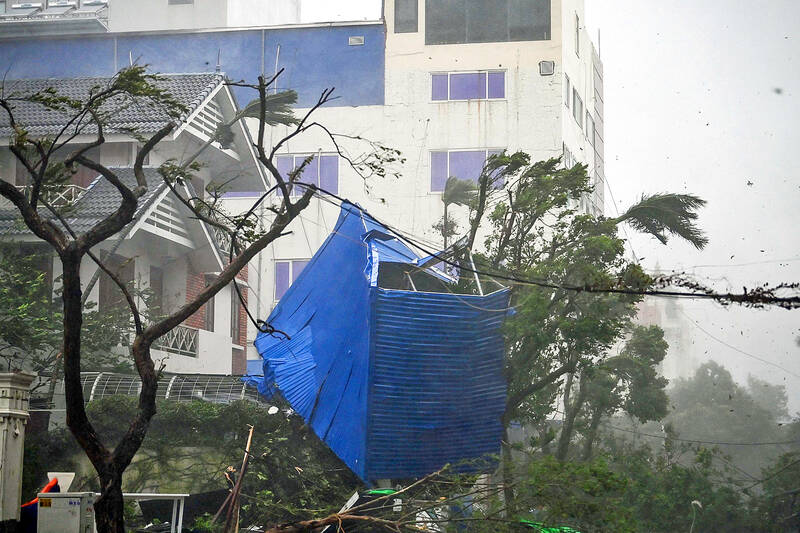Super Typhoon Yagi yesterday uprooted thousands of trees, swept ships and boats out to sea, and ripped roofs off houses in northern Vietnam, killing at least four people after leaving at least 23 dead through southern China and the Philippines.
The typhoon hit Hai Phong and Quang Ninh provinces, packing winds exceeding 149kph, the Vietnamese National Center for Hydro-Meteorological Forecasting said.
It described the typhoon as “one of the most powerful typhoons in the region over the past decade.”

Photo: AFP
The death toll from storm-related damage rose to four as roofing torn away by Yagi flew through the air, killing three residents of Quang Ninh, state media said.
A man in Hai Duong province was killed on Friday when a tree fell amid heavy winds as the storm approached landfall, while more than a dozen others, believed to be sailors on fishing boats, are missing.
In Hai Phong, streets were filled with fallen trees, metal roofing and broken signboards that had been ripped off properties.
“It has been years since I witnessed a typhoon this big,” said Tran Thi Hoa, a 48-year-old woman from Hai Phong.
“It was scary. I stayed indoors, after locking all my windows. However, the sound of the wind and the rain was unbelievable,” she said.
China Central Television said Yagi brought winds of more than 230kph, uprooting trees and prompting the evacuation of about 460,000 people.
At least three people were killed and 95 injured in southern China after the storm hit Hainan and Guangdong provinces on Friday, state-run Xinhua news agency said, citing local authorities.
Before hitting the mainland of Vietnam, the typhoon uprooted hundreds of trees on Co To island.
Several office buildings, schools and houses on the island, about 80km from mainland Quang Ninh, were unroofed by the powerful winds.
About 20,000 people had been evacuated and moved to higher ground in the north of Hai Phong, Thai Binh and Hanoi, local authorities said.
Many are being sheltered in schools, kindergartens and other public buildings.
Additional reporting by AP

TRAGEDY STRIKES TAIPEI: The suspect died after falling off a building after he threw smoke grenades into Taipei Main Station and went on a killing spree in Zhongshan A 27-year-old suspect allegedly threw smoke grenades in Taipei Main Station and then proceeded to Zhongshan MRT Station in a random killing spree that resulted in the death of the suspect and two other civilians, and seven injured, including one in critical condition, as of press time last night. The suspect, identified as a man surnamed Chang Wen (張文), allegedly began the attack at Taipei Main Station, the Taipei Fire Department said, adding that it received a report at 5:24pm that smoke grenades had been thrown in the station. One man in his 50s was rushed to hospital after a cardiac arrest

A car bomb killed a senior Russian general in southern Moscow yesterday morning, the latest high-profile army figure to be blown up in a blast that came just hours after Russian and Ukrainian delegates held separate talks in Miami on a plan to end the war. Kyiv has not commented on the incident, but Russian investigators said they were probing whether the blast was “linked” to “Ukrainian special forces.” The attack was similar to other assassinations of generals and pro-war figures that have either been claimed, or are widely believed to have been orchestrated, by Ukraine. Russian Lieutenant General Fanil Sarvarov, 56, head

SAFETY FIRST: Double the number of police were deployed at the Taipei Marathon, while other cities released plans to bolster public event safety Authorities across Taiwan have stepped up security measures ahead of Christmas and New Year events, following a knife and smoke bomb attack in Taipei on Friday that left four people dead and 11 injured. In a bid to prevent potential copycat incidents, police deployments have been expanded for large gatherings, transport hubs, and other crowded public spaces, according to official statements from police and city authorities. Taipei Mayor Chiang Wan-an (蔣萬安) said the city has “comprehensively raised security readiness” in crowded areas, increased police deployments with armed officers, and intensified patrols during weekends and nighttime hours. For large-scale events, security checkpoints and explosives

PUBLIC SAFETY: The premier said that security would be tightened in transport hubs, while President Lai commended the public for their bravery The government is to deploy more police, including rapid response units, in crowded public areas to ensure a swift response to any threats, President William Lai (賴清德) said yesterday after a knife attack killed three people and injured 11 in Taipei the previous day. Lai made the remarks following a briefing by the National Police Agency on the progress of the investigation, saying that the attack underscored the importance of cooperation in public security between the central and local governments. The attack unfolded in the early evening on Friday around Taipei Main Station’s M7 exit and later near the Taipei MRT’s Zhongshan